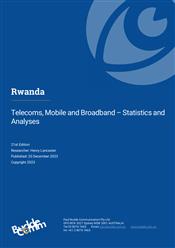Rwanda Telecoms Market Report
Telecoms, Mobile and Broadband - Statistics and Analyses

Last updated: 20 Dec 2023 Update History
Report Status: Current
Report Pages: 168
Analyst: Henry Lancaster
Rwanda’s regulator frees up LTE and 5G for MNOs’ own networks
Rwanda was slow to liberalise the mobile sector, allowing MTN Rwanda to hold a monopoly until 2006 when the fixed-line incumbent, Rwandatel (since acquired by Liquid Intelligence Technologies) became the second mobile operator. There was effective competition among three operators after Tigo launched services in 2009. However, the acquisition of Tigo by Airtel saw a significant consolidation in the market, and the cancellation of Rwandatel’s licence in 2011 resulted in the market becoming a duopoly between MTN and Airtel. MTN remains the dominant operator in the mobile sector, with a market share of subscribers of around 62%.
The fixed broadband sector has suffered from limited fixed-line infrastructure and high prices. Nevertheless, operators are rolling out national backbone networks which also allow them to connect to the international submarine cables on Africa’s east coast. These cables gave the entire region greater internet bandwidth and ended the dependency on satellites. LIT has continued to expand its FttP services across Kigali and a number of other towns, while the country also has a new cable link with Tanzania, and via Tanzania’s national broadband backbone it has gained connectivity to the networks of several other countries in the region.
The number of subscribers on LTE infrastructure has increased sharply, helped by national LTE coverage achieved in mid-2018. Mobile remains the dominant platform for voice and data services. The regulator in late 2022 changed its approach to LTE, removing the exclusivity held by KTRN as a provider of wholesale access to its network, and enabling MTN and Airtel to build their own networks. By the end of 2023 these operators had upgraded almost their entire mobile infrastructure to LTE.
Key developments:
- MTN launches its own LTE network following the adoption of the National Broadband Policy and Strategy, which liberalised MNOs’ use of mobile technologies.
- Starlink launches satellite broadband services, with the government aiming to connect most schools to the service by the end of 2024.
- Regulator trials zero rated mobile interconnection for MTN and Airtel for one year.
- Intelsat and Africa Mobile Networks agreed to deploy rural base stations providing mobile satellite connectivity in underserved areas of Rwanda.
- Report update includes the regulator’s annual report for 2021-22, market data to November 2023, telcos’ operating data to Q3 2023, updated Telecom Maturity Index tables, charts and analyses, recent market developments.
Companies mentioned in this report:
Rwandatel (Terracom, LapGreen), MTN Rwanda (MTN Rwandacell), Liquid Telecom (LIT), Tigo Rwanda (Millicom), Bharti Airtel, Artel Rwanda, Electrogaz
Related Reports
- Africa - Fixed Broadband Market - Statistics and Analyses
- Africa - Mobile Infrastructure and Mobile Broadband
- Africa - Mobile Network Operators and MVNOs
- Uganda - Telecoms, Mobile and Broadband - Statistics and Analyses
- Egypt - Telecoms, Mobile and Broadband - Statistics and Analyses
- Cameroon - Telecoms, Mobile and Broadband - Statistics and Analyses
- Kenya - Telecoms, Mobile and Broadband - Statistics and Analyses
- Nigeria - Telecoms, Mobile and Broadband - Statistics and Analyses
- Ghana - Telecoms, Mobile and Broadband - Statistics and Analyses
- Côte d Ivoire (Ivory Coast) - Telecoms, Mobile and Broadband - Statistics and Analyses
Share this Report
TMT Intelligence
A platform to scale your intelligence tasks
Monitor critical insights with our AI-powered Market Intelligence Platform gathering and analyzing intelligence in real time. With AI trained to spot emerging trends and detect new strategic opportunities, our clients use TMT Intelligence to accelerate their growth.
If you want to know more about it, please see:
Research Methodology
BuddeComm's strategic business reports contain a combination of both primary and secondary research statistics, analyses written by our senior analysts supported by a network of experts, industry contacts and researchers from around the world as well as our own scenario forecasts.
For more details, please see:
More than 4,000 customers from 140 countries utilise BuddeComm Research
Are you interested in BuddeComm's Custom Research Service?
Hot Topics
News & Views
Have the latest telecommunications industry news delivered to your inbox by subscribing to BuddeComm's weekly newsletter.